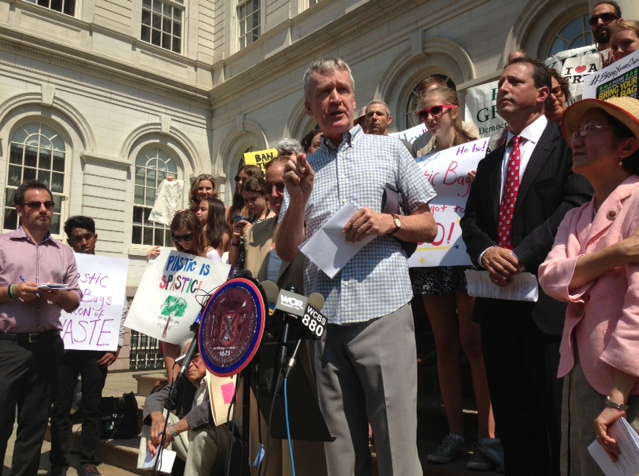
The author at a City Hall rally in support of the plastic bag bill (photo: Saleen Shah)
New York City has a bad habit that is expensive and dirty and one that we can break easily and soon.
It's the habit of using plastic bags.
And like most bad habits, we didn't always have it. For the first time in a generation or two, we are seeing reusable bags everywhere. They're even trendy. Consider this: the first plastic bags were introduced in 1977. Now they account for four out of every five bags handed out at grocery stores.
The good news is that American cities are fighting back either with legislation that reduces the use or bans them outright. Bravo to Los Angeles, San Francisco, Seattle, and Washington D.C. In an editorial, The Seattle Times challenged lawmakers saying it's high time to revisit a statewide ban.
Now the fight comes to the nation's largest city, uniting small business owners, environmentalists, and fiscal conservatives concerned about the cost of shipping trash out of the city, which amounts to an estimated $10 million to move 100,000 tons of plastic bags to landfills.
In September, right after the UN conference on climate change, our city council's sanitation and solid waste committee will hold a hearing on the proposed Lander-Chin bill that seeks to reduce the amount of single-use carryout bags that enter our waste stream.
It's encouraging news that the de Blasio administration is "very supportive" of the bill. For its part, Citizens Committee, in partnership with council members, will be holding cotton canvas bag giveaway events across the city.
How the Bill Works
The proposed bill here in the city calls for a simple 10-cent charge per bag. Who gets to keep the 10 cents per bag? Small retailers, the very folks this bill's opponents (read: the billion dollar plastics industry and its lobbyists) say will be hurt by the bill.
This commonsense approach is bringing people together in every borough and neighborhood. Council Member Brad Lander, one of the co-lead sponsors of the bill, says he believes the legislation is based on "a tried-and-tested...approach to reducing bag waste in New York City by at least 60 percent in a way that works for the environment and works for the city," according to a past Gotham Gazette piece. And Citizens Committee for New York City is just one member of a broad coalition seeking a new plastic bag law in the City Council. Co-sponsors of the bill have worked extremely hard to secure the backing of a few retail and grocery associations, a remarkable feat.
Under the proposed law, restaurants that rely on take-out and food delivery, as well as food stamp recipients, would be exempt. Some street vendors would also be exempt, unless they sell what a grocery store or retailer sells. In New York City alone, just one less grocery bag per person per year would reduce waste by five million pounds and save $250,000 in disposal costs. Also, increased proliferation of reusable bags will have a big impact. A sturdy, reusable bag needs only be used 11 times to have a lower environmental impact than using 11 disposable plastic bags.
Learn and Share
We urge you to learn these simple facts and educate your neighbors so that they can in turn educate their neighbors. After all, we live in a city full of hundreds of neighborhoods and with your support the time will soon come when plastic bag consumption finally trends down.
Plastic Bag Cheat Sheet
- Plastic bags are made from oil: it takes about 430,000 gallons of oil to produce 100 million plastic bags, and the U.S. goes through 380 billion of them a year.
- Plastic bags are not biodegradable.
- If buried, plastic bags block the natural flow of oxygen and water through the soil.
- If burned, plastic bags release dangerous toxins and carcinogens into the air.
- If simply thrown away, plastic bags clog the waste stream and other waterways.
- The EPA reports only 5.2 percent of all plastic bags are recycled, meaning the rest find their way to landfills, streets, the ocean, and almost anywhere else they don't belong.
- Plastic bags pose a serious danger to birds and marine mammals that often mistake them for food. Thousands die each year after swallowing or choking on discarded plastic bags. The United Nations Environment Program estimates that there are 46,000 pieces of plastic litter floating in every square mile of ocean.
- Department of Sanitation: New Yorkers use 5.2 billion single-use carryout bags per year.
- Department of Sanitation: As of 2008, plastic bags accounted for over 1,700 tons of residential garbage per week in NYC
- New York Times: City pays an estimated $10M to transport 100,000 tons of plastic bags to landfills
- Thin plastic shopping bags jam expensive machinery at recycling plants.
So, let's break the habit and pop the plastic bag bubble once and for all. That'll be great news for all New Yorkers.
***
Peter H. Kostmayer is the CEO of Citizens Committee for New York City and a seven-term U.S. Congressman from Bucks County, Pennsylvania.
Do you have an op-ed idea or submission for Gotham Gazette? Send it to Executive Editor Ben Max: This email address is being protected from spambots. You need JavaScript enabled to view it.




